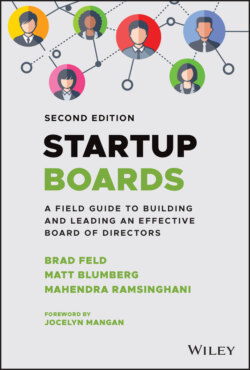Читать книгу Startup Boards - Sacca Chris, Chris Sacca, Brad Feld - Страница 12
Addressing Conflicting Duties
ОглавлениеConflicts between fiduciary duties, such as the one mentioned by Jon Callaghan above, periodically come up in the boardroom. Some VCs are transparent when faced with a conflict, while others are opaque. In other situations, especially with inexperienced VCs, they aren't even aware of the conflict. Helping you identify and navigate these situations is another reason to have experienced outside counsel at every board meeting.
If you get your knowledge and experience about boardroom dynamics from TV shows like Billions and Succession, you might think that the legal dynamics are the things the lawyers have to deal with, so your goal is just to win the negotiation when there's a conflict. However, if you are trying to build an effective company with a highly functional board, you'll realize that whenever a conflict arises, the best approach is to air it out, debate it, and figure out a solution before the conflict escalates.
Imagine a situation where an acquirer makes a moderately appealing offer to buy a company. In this situation, the founders, the common shareholders, the early investors (let's call them Early VC), and the employees will make a nice return. However, the last-round investor will only get its money back. While the company can continue to operate for a year with the cash in the bank, the founders and early investors decide they would like to sell the company. However, the last-round investor (let's call the firm Late VC) doesn't want to sell.
Late VC previously negotiated blocking rights as part of its protective provisions (in the financing documents) on the sale of a company for less than 1.5× their investment. This disagreement is the first time this particular issue has come up, and no one other than the Late VC realizes that Late VC can block the transaction using its protective provision.
The board discusses the transaction extensively, with Late VC insisting the company should keep running independently for at least another year, given the potential future opportunity. However, the founders and Early VC want to cash in. Not realizing that Late VC has blocking rights, Early VC says, “Let's put it to a vote.” The founder/CEO forgot to invite outside counsel to the board meeting, so no one reminds the board members of Late VC's blocking rights.
In this situation, there's a board vote and, while Late VC votes against the transaction, a majority of board members vote to sell the company. However, Late VC says, “Hang on a second, I'm going to exercise my preferred right to block the sale of the company.” Everyone looks at each other angrily. Early VC rolls out the phrase “fiduciary duty” and angrily tries to school Late VC, who is very experienced, that Late VC has a fiduciary duty to all shareholders. Late VC smiles coyly and counters that it also has a fiduciary duty to its limited partners and is protecting that duty by exercising the protective provision it negotiated as part of the last financing round.
Eventually, one of the founders says, “Late VC board member, what do you want?”
Late VC responds, “At least 1.5× my investment or let's keep running the company since we have plenty of cash on the balance sheet—the cash that I recently gave you!”
It's worth recognizing the Late VC could have also voted, in its capacity as a board member, for the transaction but then exercised its protective provision separately to block the transaction from proceeding.
There are multiple solutions to this situation. But understanding the potential conflicts early, especially in any transactional situations, and having open discussions about how to resolve them that include the advice of counsel are the best approach.
